Unit 1 Playing Sports 考点精析课件(仁爱科普版八年级上册)
文档属性
| 名称 | Unit 1 Playing Sports 考点精析课件(仁爱科普版八年级上册) | 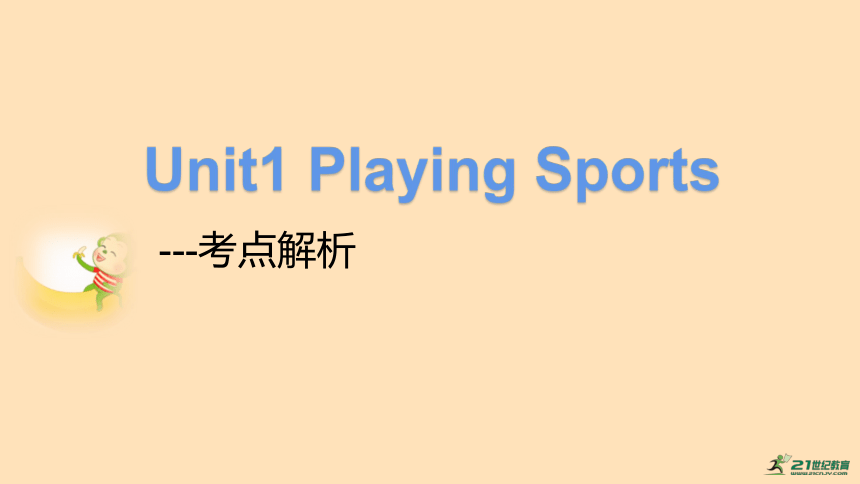 | |
| 格式 | pptx | ||
| 文件大小 | 309.6KB | ||
| 资源类型 | 试卷 | ||
| 版本资源 | 仁爱科普版 | ||
| 科目 | 英语 | ||
| 更新时间 | 2023-09-06 23:36:08 | ||
图片预览

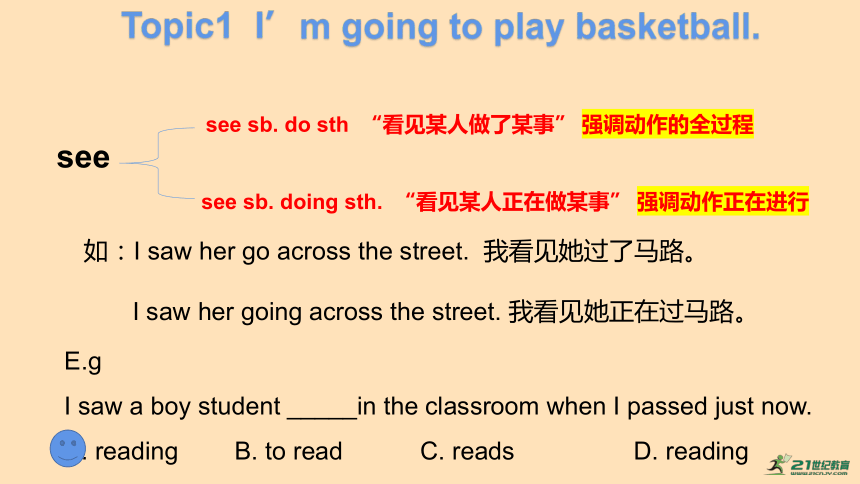
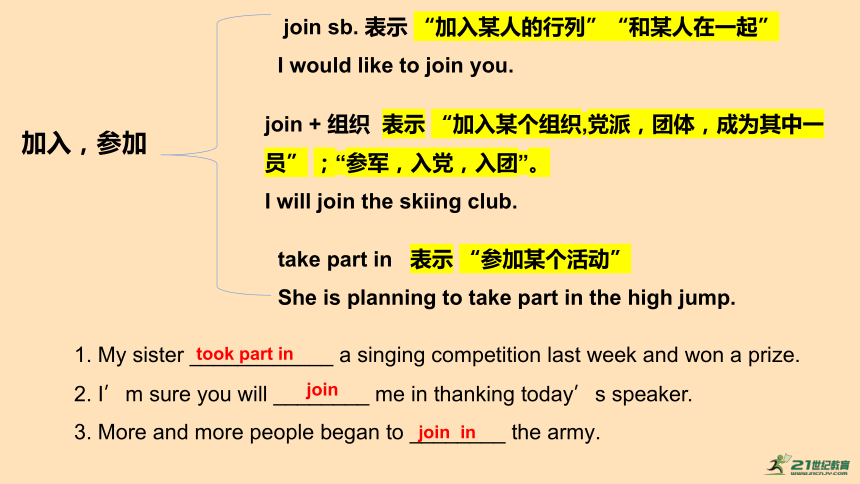

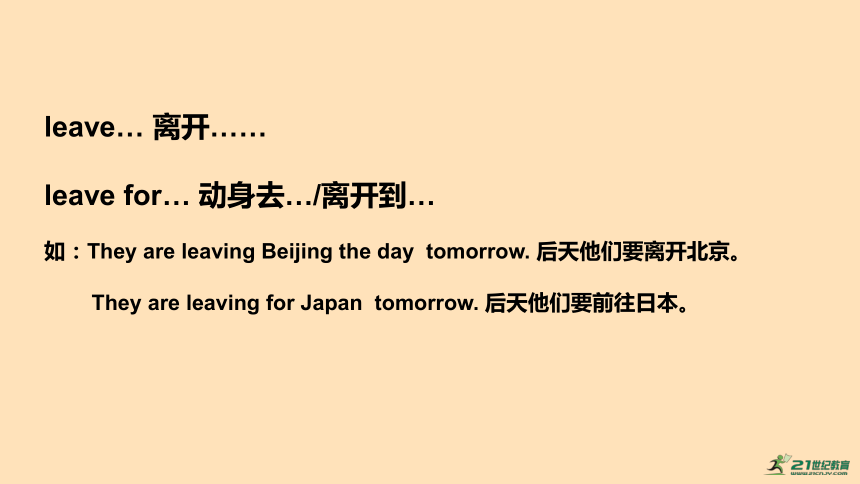
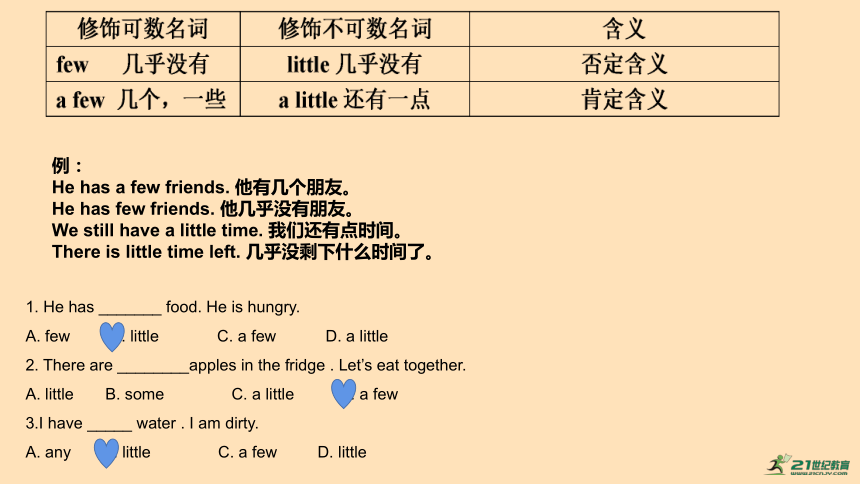
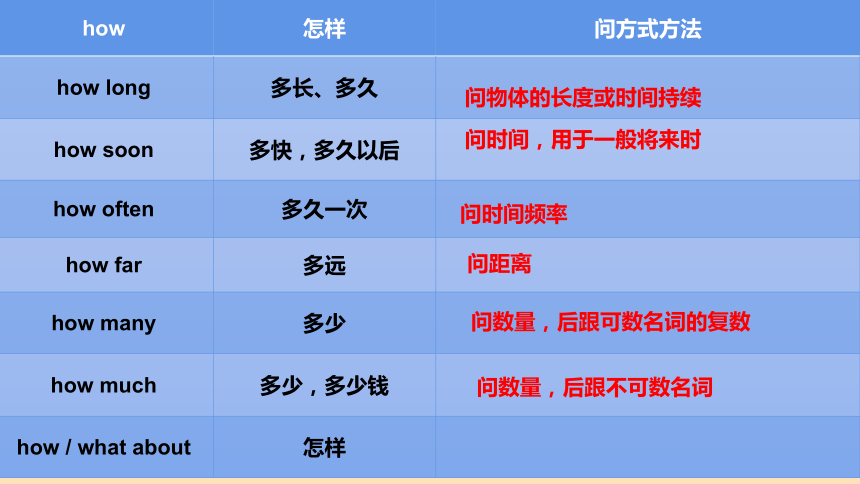
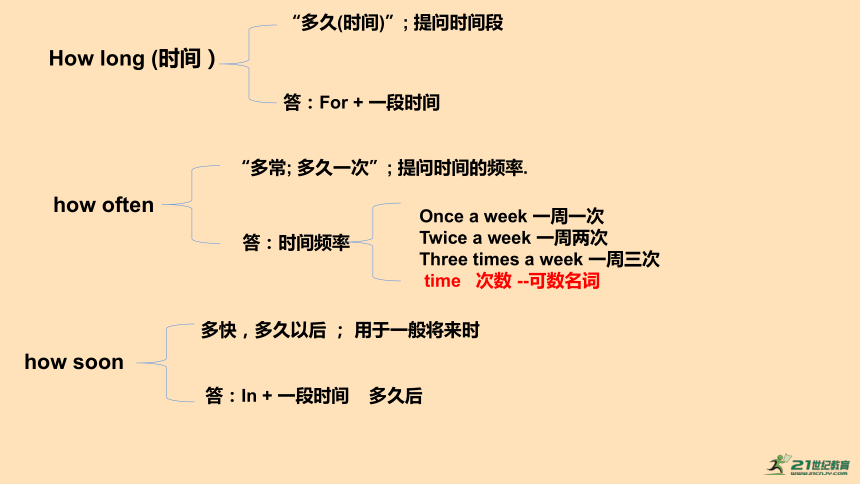
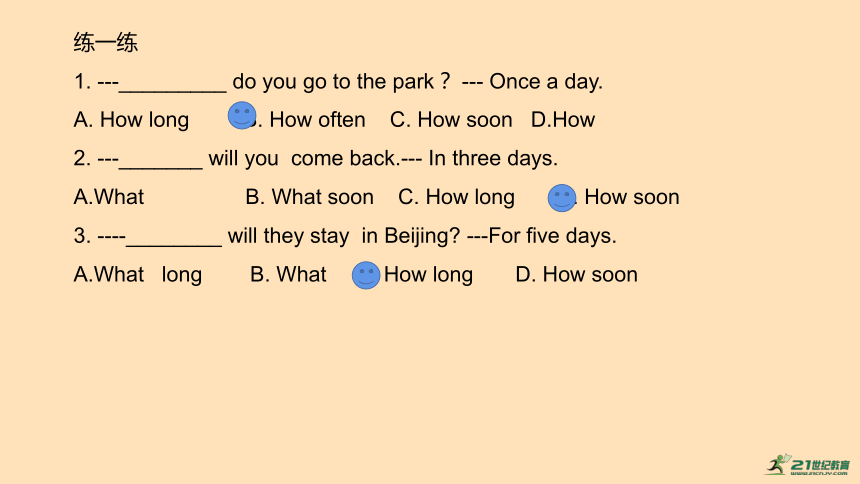
文档简介
(共23张PPT)
Unit1 Playing Sports
---考点解析
Topic1 I’m going to play basketball.
see
see sb. do sth “看见某人做了某事” 强调动作的全过程
see sb. doing sth. “看见某人正在做某事” 强调动作正在进行
如:I saw her go across the street. 我看见她过了马路。
I saw her going across the street. 我看见她正在过马路。
E.g
I saw a boy student _____in the classroom when I passed just now.
A. reading B. to read C. reads D. reading
加入,参加
join sb. 表示 “加入某人的行列”“和某人在一起”
I would like to join you.
join + 组织 表示 “加入某个组织,党派,团体,成为其中一员” ;“参军,入党,入团”。
I will join the skiing club.
take part in 表示 “参加某个活动”
She is planning to take part in the high jump.
1. My sister ____________ a singing competition last week and won a prize.
2. I’m sure you will ________ me in thanking today’s speaker.
3. More and more people began to ________ the army.
took part in
join
join in
到达
arrive in + 大地点 (国家,城市)
arrive at + 小地点 ( 车站,学校,景点。。。)
get to + 地点 = reach + 地点
I arrived at the Great Wall. = I got to the Great Wall. = I reached the Great Wall.
注意:reach here/there/home = get here/there/home = arrive here/there/home
1. I will ________ the station five minutes late.
A.arrive B. arrive in C. arrived at D. arrive at
2. I always______the school before seven o'clock.
A. reach to B. get C. arrive D. reach
3. --- When did Cathy ______China
--- She______ here on June, 26th.
A. arrived in; arrived B. arrived at; got to C. reach to; got D. get; arrive
leave… 离开……
leave for… 动身去…/离开到…
如:They are leaving Beijing the day tomorrow. 后天他们要离开北京。
They are leaving for Japan tomorrow. 后天他们要前往日本。
例:
He has a few friends. 他有几个朋友。
He has few friends. 他几乎没有朋友。
We still have a little time. 我们还有点时间。
There is little time left. 几乎没剩下什么时间了。
1. He has _______ food. He is hungry.
A. few B. little C. a few D. a little
2. There are ________apples in the fridge . Let’s eat together.
A. little B. some C. a little D. a few
3.I have _____ water . I am dirty.
A. any B. little C. a few D. little
Summary
how 怎样 问方式方法
how long 多长、多久
how soon 多快,多久以后
how often 多久一次
how far 多远
how many 多少
how much 多少,多少钱
how / what about 怎样
问物体的长度或时间持续
问时间,用于一般将来时
问时间频率
问距离
问数量,后跟可数名词的复数
问数量,后跟不可数名词
How long (时间)
“多久(时间)”; 提问时间段
答:For + 一段时间
how often
“多常; 多久一次”; 提问时间的频率.
答:时间频率
Once a week 一周一次
Twice a week 一周两次
Three times a week 一周三次
time 次数 --可数名词
how soon
多快,多久以后 ; 用于一般将来时
答:In + 一段时间 多久后
练一练
1. ---_________ do you go to the park? --- Once a day.
A. How long B. How often C. How soon D.How
2. ---_______ will you come back.--- In three days.
A.What B. What soon C. How long D. How soon
3. ----________ will they stay in Beijing ---For five days.
A.What long B. What C. How long D. How soon
be good at (doing) sth. = do well in (doing) sth. 擅长于(做)某事
如:She is good at (playing) baseball. = She does well in (playing) baseball.
be bad at (doing) sth. = be weak in (doing) sth. 不擅长于(做)某事
I am bad at grammar.= I am weak in grammar.
介词+ Ving
E.g Sam and Tim are good at _______________(swim)
swimming
make
do ( V原) sth.
sth/sb + adj. 使某物(某人)在某种状态
keep
doing ( Ving) sth.
keep …sth/sb + adj. 保持某物(某人)在某种状态
如:Playing soccer can make your body strong.
Swimming can help to keep your heart and lungs healthy.
1.Please make your door ______.
A. opens B. to open C. opening D. open
2. Never give up ! Keep ______.
A.try B.trying C.to try D. tries
3. Sorry, I can’t make you _______.
A. smiling B. smiles C.smile D. to smile
4. I love my mother . I want to make her______.
A.sad B.happy C. angry D. boring
Topic2 We should learn teamwork.
1. ill 与 sick“生病的”, ill只能作 表语, 而sick既可作表语也可作 定语。
The man is ill/sick. 那个男人病了. (作表语)
He is a sick man. 他是个病人. (作定语)
解释说明主语
放在be动词,连系动词,感官动词之后
起修饰作用,
2. mind
V. “介意” mind (not) doing sth 表示“(不)做某事介意
n. “决心, 心思” make up one’s mind to do sth 下定决心 做某事
n. “头脑;大脑,注意力,记忆力”
lose one’s mind 精神失常 call noe’s mind 唤起某人的记忆
have in mind 铭记于心 in one’s mind 在某人的脑海里
1. Would you mind ______ it
A. checking B. check C. to check D. checks
2. Would you mind not _____ here
A. smoke B.smoking C. smokes D. to smoke
3.This photo made up _____ mind. I was so excited.
A. him B. I C. me D. my
3. miss
错过 I missed the last bus yesterday. 昨天我错过最后一班车
想念 He missed his mother. 他想念他的母亲.
遗失 My God! I missed(=lost) my key. 天啊! 我把钥匙弄丢了.
4. be sure to do sth. = be sure that + 句子 “确定做某事
We are sure to win next time. = We are sure that we will win next time.
我们确信下次一定会赢。
5. be sorry for… “为某事抱歉”
be sorry to do sth. = be sorry (that) + 句子 “很抱歉做了某事”
I am very sorry for what I said. 我为我所说的话感到抱歉。
I’m sorry I lost your book. = I’m sorry to lose your book. 很抱歉弄丢你的书。
-ed 主语是人
-ing 主语是事物
tired adj. “(感到)疲惫的” excited 感到兴奋的
interested 感到有趣的 bored 感到无聊的
tiring adj. 令人疲劳的 exciting 令人兴奋的
interesting 有趣的 boring 感到无聊的
1. The movie is ______ . I am so _______.
A. boring ; bored B. bored ; bore C. interested ; interesting
2. This book is wonderful. I am ______.
A. exciting B. bored C. excited
3. The ______story makes me _______.
A.interesting ; excited B. interesting;bored C. bored ; boring
5. 15-year-old “15岁的”= 15 years old “15岁”
如:He is a 15-year-old boy. = The boy is 15 years old.
6. instead “替代,相反”, 一般单独使用,放在句末,前面用逗号隔开。
instead of…“替代……;而不是……”
I won’t go to Shanghai. I’ll go to Beijing, instead. 。= I’ll go to Beijing instead of Shanghai.
I drank a lot of milk instead of water. 我喝了许多牛奶而不是水。
7. “从做…….中获得乐趣”
have fun doing sth.
enjoy doing sth.
have a good time
have a great time
enjoy oneself
have fun
“玩得开心”
如:I have great fun running. = I enjoy running.
我总能在跑步中得到很大乐趣。
Topic3 The school sports meet is coming.
fill
fill out + 名词 “填好……”
fill + 名词/代词+out
Please fill out this form. = Please fill this form out. 请填好这张表格。
Please fill it/them out. (当宾语是代词时, 只能放中间) 请把它(们)填好。
be filled with == be full of 充满,填满
The bottle is filled with water.=The bottle is full of water.
be afraid of sth / sb “害怕(做, 某人)……”
be afraid of doing sth 担心会发生某事
be afraid to do sth 不敢做某事
be afraid…“恐怕” 指有礼貌地、委婉地拒绝别人.
afraid
I’m afraid I won’t be free. 我恐怕没有空。
He is afraid of dogs. 他害怕狗。
They are afraid of losing the game. 他们害怕输了比赛.
She is afraid to climb the tree. 她不敢爬树
【重点语法】
一般将来时
1. be going to 结构
① 表示主语计划、打算做某事。这种打算常经过预先考虑并含有自己做好某些准备的意思。
I’m going to play basketball with my classmates this Sunday.
②表预测,指根据迹象推测,而且马上或很快就要发生。
Look at those clouds. It’s going to rain.
瞧那些乌云!快要下雨了!
2. will + 动词原形 表示单纯的将来事实。
常与表将来的时间状语如:tomorrow, soon, later, next time(week/month/year…)等连用。
will not = won’t==’ll.
① 表示作出立即的决定,是临时的一种决定。
② 表示预测。指说话人对于将来的看法、假设和推测。
③ 表示许诺。
3. 动词plan, come, go, leave等瞬时动词用现在进行时表示将要发生的事。
I’m coming. 我就来。
He is leaving for Shanghai. 他将到上海去。
We are going to Beijing. 我们将去北京。
Thank you
Unit1 Playing Sports
---考点解析
Topic1 I’m going to play basketball.
see
see sb. do sth “看见某人做了某事” 强调动作的全过程
see sb. doing sth. “看见某人正在做某事” 强调动作正在进行
如:I saw her go across the street. 我看见她过了马路。
I saw her going across the street. 我看见她正在过马路。
E.g
I saw a boy student _____in the classroom when I passed just now.
A. reading B. to read C. reads D. reading
加入,参加
join sb. 表示 “加入某人的行列”“和某人在一起”
I would like to join you.
join + 组织 表示 “加入某个组织,党派,团体,成为其中一员” ;“参军,入党,入团”。
I will join the skiing club.
take part in 表示 “参加某个活动”
She is planning to take part in the high jump.
1. My sister ____________ a singing competition last week and won a prize.
2. I’m sure you will ________ me in thanking today’s speaker.
3. More and more people began to ________ the army.
took part in
join
join in
到达
arrive in + 大地点 (国家,城市)
arrive at + 小地点 ( 车站,学校,景点。。。)
get to + 地点 = reach + 地点
I arrived at the Great Wall. = I got to the Great Wall. = I reached the Great Wall.
注意:reach here/there/home = get here/there/home = arrive here/there/home
1. I will ________ the station five minutes late.
A.arrive B. arrive in C. arrived at D. arrive at
2. I always______the school before seven o'clock.
A. reach to B. get C. arrive D. reach
3. --- When did Cathy ______China
--- She______ here on June, 26th.
A. arrived in; arrived B. arrived at; got to C. reach to; got D. get; arrive
leave… 离开……
leave for… 动身去…/离开到…
如:They are leaving Beijing the day tomorrow. 后天他们要离开北京。
They are leaving for Japan tomorrow. 后天他们要前往日本。
例:
He has a few friends. 他有几个朋友。
He has few friends. 他几乎没有朋友。
We still have a little time. 我们还有点时间。
There is little time left. 几乎没剩下什么时间了。
1. He has _______ food. He is hungry.
A. few B. little C. a few D. a little
2. There are ________apples in the fridge . Let’s eat together.
A. little B. some C. a little D. a few
3.I have _____ water . I am dirty.
A. any B. little C. a few D. little
Summary
how 怎样 问方式方法
how long 多长、多久
how soon 多快,多久以后
how often 多久一次
how far 多远
how many 多少
how much 多少,多少钱
how / what about 怎样
问物体的长度或时间持续
问时间,用于一般将来时
问时间频率
问距离
问数量,后跟可数名词的复数
问数量,后跟不可数名词
How long (时间)
“多久(时间)”; 提问时间段
答:For + 一段时间
how often
“多常; 多久一次”; 提问时间的频率.
答:时间频率
Once a week 一周一次
Twice a week 一周两次
Three times a week 一周三次
time 次数 --可数名词
how soon
多快,多久以后 ; 用于一般将来时
答:In + 一段时间 多久后
练一练
1. ---_________ do you go to the park? --- Once a day.
A. How long B. How often C. How soon D.How
2. ---_______ will you come back.--- In three days.
A.What B. What soon C. How long D. How soon
3. ----________ will they stay in Beijing ---For five days.
A.What long B. What C. How long D. How soon
be good at (doing) sth. = do well in (doing) sth. 擅长于(做)某事
如:She is good at (playing) baseball. = She does well in (playing) baseball.
be bad at (doing) sth. = be weak in (doing) sth. 不擅长于(做)某事
I am bad at grammar.= I am weak in grammar.
介词+ Ving
E.g Sam and Tim are good at _______________(swim)
swimming
make
do ( V原) sth.
sth/sb + adj. 使某物(某人)在某种状态
keep
doing ( Ving) sth.
keep …sth/sb + adj. 保持某物(某人)在某种状态
如:Playing soccer can make your body strong.
Swimming can help to keep your heart and lungs healthy.
1.Please make your door ______.
A. opens B. to open C. opening D. open
2. Never give up ! Keep ______.
A.try B.trying C.to try D. tries
3. Sorry, I can’t make you _______.
A. smiling B. smiles C.smile D. to smile
4. I love my mother . I want to make her______.
A.sad B.happy C. angry D. boring
Topic2 We should learn teamwork.
1. ill 与 sick“生病的”, ill只能作 表语, 而sick既可作表语也可作 定语。
The man is ill/sick. 那个男人病了. (作表语)
He is a sick man. 他是个病人. (作定语)
解释说明主语
放在be动词,连系动词,感官动词之后
起修饰作用,
2. mind
V. “介意” mind (not) doing sth 表示“(不)做某事介意
n. “决心, 心思” make up one’s mind to do sth 下定决心 做某事
n. “头脑;大脑,注意力,记忆力”
lose one’s mind 精神失常 call noe’s mind 唤起某人的记忆
have in mind 铭记于心 in one’s mind 在某人的脑海里
1. Would you mind ______ it
A. checking B. check C. to check D. checks
2. Would you mind not _____ here
A. smoke B.smoking C. smokes D. to smoke
3.This photo made up _____ mind. I was so excited.
A. him B. I C. me D. my
3. miss
错过 I missed the last bus yesterday. 昨天我错过最后一班车
想念 He missed his mother. 他想念他的母亲.
遗失 My God! I missed(=lost) my key. 天啊! 我把钥匙弄丢了.
4. be sure to do sth. = be sure that + 句子 “确定做某事
We are sure to win next time. = We are sure that we will win next time.
我们确信下次一定会赢。
5. be sorry for… “为某事抱歉”
be sorry to do sth. = be sorry (that) + 句子 “很抱歉做了某事”
I am very sorry for what I said. 我为我所说的话感到抱歉。
I’m sorry I lost your book. = I’m sorry to lose your book. 很抱歉弄丢你的书。
-ed 主语是人
-ing 主语是事物
tired adj. “(感到)疲惫的” excited 感到兴奋的
interested 感到有趣的 bored 感到无聊的
tiring adj. 令人疲劳的 exciting 令人兴奋的
interesting 有趣的 boring 感到无聊的
1. The movie is ______ . I am so _______.
A. boring ; bored B. bored ; bore C. interested ; interesting
2. This book is wonderful. I am ______.
A. exciting B. bored C. excited
3. The ______story makes me _______.
A.interesting ; excited B. interesting;bored C. bored ; boring
5. 15-year-old “15岁的”= 15 years old “15岁”
如:He is a 15-year-old boy. = The boy is 15 years old.
6. instead “替代,相反”, 一般单独使用,放在句末,前面用逗号隔开。
instead of…“替代……;而不是……”
I won’t go to Shanghai. I’ll go to Beijing, instead. 。= I’ll go to Beijing instead of Shanghai.
I drank a lot of milk instead of water. 我喝了许多牛奶而不是水。
7. “从做…….中获得乐趣”
have fun doing sth.
enjoy doing sth.
have a good time
have a great time
enjoy oneself
have fun
“玩得开心”
如:I have great fun running. = I enjoy running.
我总能在跑步中得到很大乐趣。
Topic3 The school sports meet is coming.
fill
fill out + 名词 “填好……”
fill + 名词/代词+out
Please fill out this form. = Please fill this form out. 请填好这张表格。
Please fill it/them out. (当宾语是代词时, 只能放中间) 请把它(们)填好。
be filled with == be full of 充满,填满
The bottle is filled with water.=The bottle is full of water.
be afraid of sth / sb “害怕(做, 某人)……”
be afraid of doing sth 担心会发生某事
be afraid to do sth 不敢做某事
be afraid…“恐怕” 指有礼貌地、委婉地拒绝别人.
afraid
I’m afraid I won’t be free. 我恐怕没有空。
He is afraid of dogs. 他害怕狗。
They are afraid of losing the game. 他们害怕输了比赛.
She is afraid to climb the tree. 她不敢爬树
【重点语法】
一般将来时
1. be going to 结构
① 表示主语计划、打算做某事。这种打算常经过预先考虑并含有自己做好某些准备的意思。
I’m going to play basketball with my classmates this Sunday.
②表预测,指根据迹象推测,而且马上或很快就要发生。
Look at those clouds. It’s going to rain.
瞧那些乌云!快要下雨了!
2. will + 动词原形 表示单纯的将来事实。
常与表将来的时间状语如:tomorrow, soon, later, next time(week/month/year…)等连用。
will not = won’t==’ll.
① 表示作出立即的决定,是临时的一种决定。
② 表示预测。指说话人对于将来的看法、假设和推测。
③ 表示许诺。
3. 动词plan, come, go, leave等瞬时动词用现在进行时表示将要发生的事。
I’m coming. 我就来。
He is leaving for Shanghai. 他将到上海去。
We are going to Beijing. 我们将去北京。
Thank you
同课章节目录
- Unit 1 Playing Sports
- Topic 1 I'm going to play basketball.
- Topic 2 I'll kick you the ball again.
- Topic 3 The school sports meet is coming.
- Unit 2 Keeping Healthy
- Topic 1 You should brush your teeth twice a day.
- Topic 2 I must ask him to give up smoking.
- Topic 3 Must we exercise to prevent the flu?
- Unit 3 Our Hobbies
- Topic 1 What's your hobby?
- Topic 2 What sweet music!
- Topic 3 What were you doing at this time yesterday
- Unit 4 Our World
- Topic 1 What's the strongest animal on the farm?
- Topic 2 How can we protect ourselves from the eart
- Topic 3 The Internet makes the world smaller.
